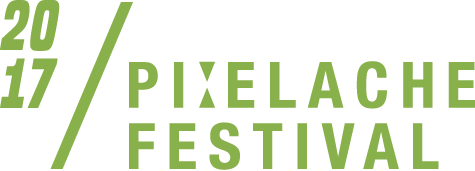| PRESS RELEASE AUGUST 15, 2017
PIXELACHE FESTIVAL:
LOCAL & DECENTRALISED
September 22-24, 2017 in Suvilahti, Helsinki
The 2017 edition of Pixelache Festival gathers stories of Local & Decentralised governance. To materialise the festival theme, Pixelache Festival hosts an open assembly each festival evening between 6-9 pm focusing on the shift from centralised capital-based economies to decentralised peer-based resource distribution. Assemblies are open for everyone and offer a meeting point for local initiatives reflecting on decentralisation in different fields.
The festival will also offer variety of workshops on ecological issues, recycling, commons, cultural coding, and democracy - without forgetting extensive evening programme with music, art and parties. The Sauna next to Oranssi building will be on during the festival (bring your own towel!). The programme is suitable for families and free entry.
Public Space And The Dilemma Of Over-planning
One of the main themes of Pixelache Festival 2017 is urban planning and the local community is called to join the collective design of a temporary public venue in Helsinki.
Recently, the City of Helsinki has opened urban planning for participation because the tendency to over-plan public spaces restricts possibilities for spontaneous activities. Many existing places that host outdoor-indoor activities are bond by some form of financial compensation and planning ahead to reserve these spaces is often needed.
Pixelache Festival 2017 wants to answer to these needs by coordinating the collective design of a temporary pavilion and building it in Suvilahti in August 2018 prior to next year’s Pixelache Festival. With the construction of the pavilion we want to address the lack of non-commercial, open public space, versatile enough for multiple use, neutral in terms of commercial identity and always available for spontaneous activities. Furthermore, Pixelache wants to provide a light and elegant construction durable enough to provide shelter in weather conditions of Helsinki around the year, and a design capable to create bonds and ownership between the public and the place.
Pre-festival and festival activities at Oranssi premises in Suvilahti, September 19-24, 2017.
Opening of the festival at Oranssi, Friday September 22 at 5:00 pm.
Exhibition Pixelache and Koelse 15 years in Muu Gallery, Lönnrotinkatu 33, September 21-30, 2017. Opening September 21, 2017 at 5:00 pm. Free entry.
The permanent tenants of Suvilahti area, Oranssi and Pixelache members' have a key role in the main program of the festival and their presence is an essential element for the identity of Pixelache: Local & Decentralised.
Pixelache 2017 Festival Local & Decentralised is supported by the Finnish Ministry of Education and Culture, the City of Helsinki Cultural Office, Svenska kulturfonden and Genelec.
More information: https://festival.pixelache.ac/
Contact Publicist Jaana Eskola, jaana@pixelache.ac
or Festival Main Coordinator Egle Oddo, egle@pixelache.ac

Päivi Raivio, Sloganeering
|
|
A SELECTION OF THE PROGRAMME
Repair! workshop wants re-assess our perceptions about ownership, civil engagement and responsible consumption. The workshop is open to everyone, free of charge and the people participating are encouraged to bring their own clothes and things to repair, mend or up-cycle as well as to discuss about future exchanges and engagements with the project.
A Public Assembly held on Friday 22nd, Saturday 23rd and Sunday 24th August between 6-9pm at Oranssi building gathers together several groups working on issues of public interest. Yhteismaa, Pixelache and Commons.fi are calling for a discussion on "What economy for Helsinki?", to identify and promote joint advocacy towards the City of Helsinki by other-economy actors in Helsinki. RIPESS Europecoordination team will also be participating the Assembly and share their experiences from neighbouring countries.
Commons.fi provides a forum for people furthering the commons and commoning – including those engaged in solidarity economy building, developing co-ops, working with alternative currencies, ethical finance, collective gardening, protecting commons resources (like water, air or land), environmental activism and developing new forms of legal frameworks for the commons (e.g. the Creative Commons licences).
Artist duo Nabb+Teeri work with material surplus of both human and non-human activity. Alongside of borrowed, recycled and remodeled or found materials and objects, their stratified, mesh-like works include elements created with 3D modelling or other digital technologies. These often ephemeral works change their form throughout long processes. For the festival, Nabb+Teeri will build installations that function as meeting places.

Nabb+Teeri
Artists Oliver Kochta-Kalleinen & Owen Kelly offer a workshop Feel the Smoothness: an Open Source Toolkit for Healthy and_Rejuvenated Skin in which up to 20 people will explore different tools for decision making in practical terms - by working together to plan and create an invigorating and rejuvenating face-cream or mask, and communicate instructions for making it.
Artist Arlene Tucker and Susanne Palzer’s workshop TID: Exploring Hypertext invites Pixelache visitors to come on a playful collaborative excursion around Suvilahti to explore their subjective perceptions of the shared environment, record descriptions of what they see and to collect relevant material. Visitors’ perceptions are then used to create a hypertext installation from the descriptions and found materials, making new connections and new artwork. The workshop is open for children and adults and is free of charge.
In festival’s evening program, Tomplex, Dj Bunuel, Random Doctors, Olivier Auber,Krisjanis Rijnieks, and various artists create live music and visual experiences where the audience feel the depths of our cultural subconscious, seeking the magical moment when music, visuals and audience become one.

Random Doctors
Fuckup Night Pixelache is inspired by the global movement of similarly named events around the world, originating from a group of friends in Mexico in 2012 who thought failures should be celebrated. The start-up entrepreneurial world is full of them, and likewise so is the cultural associational scene. Hybrid practitioners, artists, producers, designers, makers and researchers all make fuckups in relation to de/centralisation, privatisation, commoning and locality. Can we learn from them?

|
|
|
|










